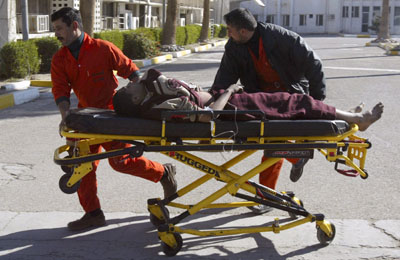Twin car bombs kill 13 in Baghdad
(AP)Updated: 2007-01-05 08:53
BAGHDAD, Iraq - Twin car bombs killed 13 people Thursday in an upscale Baghdad neighborhood after a lull in violence during an Islamic holiday, and Iraq prepared to execute two of Saddam Hussein's co-defendants despite an inquiry into an unruly scene in the former dictator's execution chamber.
Firefighters sprayed streams of water on the wreckage as soldiers and civilians staggered around in a daze. "What do they want from us? What do they want from us?" one Iraqi soldier asked, referring to those behind the blasts. Blood pooled among scattered containers for propane and kerosene, near where tea cups lay toppled on a blanket spread over wood crates.
A woman in a black Muslim veil sat weeping on a curb outside Yarmouk hospital, where victims were taken. The wounded lay on stretchers crowded into the hallway inside.
Mansour is a primarily Sunni neighborhood in western Baghdad. During Saddam's regime, it was home to the most elite Iraqi families; many international embassies remain there, though shuttered.
Maj. Gen. William B. Caldwell said this week there had been a "downturn" in violence during the four-day Muslim holiday of Eid al-Adha, which began last weekend. Thursday was the first day after Eid for both Sunnis and Shiites. Caldwell acknowledged the possibility that violence could surge again.
Police said 47 tortured bodies were found dumped across Baghdad on Thursday, up from 27 a day earlier.
Despite the burgeoning row over Saddam's hanging as well as a call for restraint from the United Nations, Iraqi officials said Thursday they planned to execute two of the executed dictator's co-defendants in the coming days.
"Nobody can stop the carrying out of court verdicts," Sami al-Askari, an adviser to the prime minister, told the BBC's Arabic service. "The court's statute does not allow even the president of the republic or the prime minister to commute sentences, let alone grant a pardon. Therefore, no pressure can stop the executions."
U.N. High Commissioner for Human Rights Louise Arbour appealed to Iraq not to execute Barzan Ibrahim, Saddam's half brother and former intelligence chief, and Awad Hamed al-Bandar, former head of the Revolutionary Court. Saddam and the two men were sentenced to death for the killing of 148 Shiites.
In Washington, lawyers for al-Bandar filed another request for the U.S. Supreme Court, this time to Justice John Paul Stevens, to block his transfer to Iraqi custody. Chief Justice John Roberts turned down an identical request on Wednesday.
Meanwhile, Iraq's interior minister said whoever recorded Saddam's hanging on a cell phone camera would be punished, and al-Askari said two Justice Ministry guards were being questioned.
"The investigation committee is interrogating the men. If it is found that any official was involved, he will face legal measures," al-Askari said, referring to a committee set up by Prime Minister Nouri al-Maliki to determine the video's origin and punish those involved.
The grainy video shows Saddam being taunted in his final moments Saturday, to shouts of "Go to hell!" and "Muqtada, Muqtada" - a reference to radical cleric Muqtada al-Sadr, who commands a Shiite militia responsible for violence against Saddam's fellow Sunnis.
Some officials have suggested the execution chamber was infiltrated by militiamen, but prosecutor Munqith al-Faroon, one of 14 official witnesses to the hanging, told Iraqi state television that wasn't the case.
"For reality and history, I say none of the militias attended the execution - only guards from the Justice Ministry," al-Faroon said. "I believe there wasn't any legal abuse, only moral violations."
The video also shows the former leader's death, when he drops through a trapdoor on the gallows and swings from a rope, his neck twisted and eyes open.
"The case of the filming of Saddam's execution is very critical," Interior Minister Jawad al-Bolani told reporters. "We made arrests and the investigation is going on. ... We'll punish them."
He did not give details on the suspects or say what punishment they might face.
The video was splashed on television screens and Web sites, startling the world with its ghastly depiction of Saddam's death and the chaos that preceded it. Many Iraqis loaded it onto cell phones.
In the southern city of Basra on Thursday, 1,500 people demonstrated to express approval of Saddam's execution. The peaceful rally began at the offices of the Dawa party and ended at the provincial governor's building. The prime minister, who pushed for a speedy execution of Saddam, is a leader of the Dawa party.
| ||
|
||
|
||
|
|

